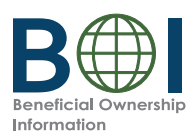What is the BOIR, and Why Should Your Small Business Care?
If you’ve started hearing about BOIR (Beneficial Ownership Information Reporting) and aren’t quite sure what it’s all about, don’t worry—you’re not alone! BOIR is a new rule that requires certain businesses to share information about who really owns or controls them. It might sound complicated, but it’s actually a big step toward creating a more honest and transparent business world.
Let’s break it down so you know what it means, why it matters, and how you can easily stay on top of it.
What Exactly is BOIR?
Think of the BOIR as a way for the government (through FinCEN—the Financial Crimes Enforcement Network) to keep track of who’s really running the show at businesses across the country.
You’ll need to report details about your beneficial owners—the people who:
Own 25% or more of your business, OR
Have significant control over how your business operates.
Most small businesses, LLCs, and corporations need to file, but some bigger businesses and nonprofits are off the hook
Why Should You Care About BOIR?
Here’s why this matters for your business:
1. It’s the Law
Not filing isn’t just “forgetting a form.” It can lead to daily fines and even criminal charges. Yikes!
2. It Helps Build Trust
BOIR makes it harder for shady companies to hide what they’re up to. By filing, you show your customers, partners, and community that your business plays fair.
3. Avoid Headaches Later
Getting this done now means you won’t have to worry about penalties or playing catch-up if things change with your business ownership
How to File (Without the Stress)
Here’s how to tackle BOIR, step by step:
Step 1: Find Out if You Need to File
Most small businesses need to file, but double-check to be sure. If your business is brand new or you’re unsure, ask your accountant or lawyer.
Step 2: Gather Your Info
You’ll need:
Your business details: Name, address, and EIN (Employer Identification Number).
Owner info: Name, date of birth, address, and an official ID number (from a driver’s license or passport).
Step 3: File Online with FinCEN
Head to FinCEN’s website, fill out the form, and submit it. It’s all online and doesn’t take too long if you have your info ready.
Step 4: Keep It Updated
Got new owners or major changes? You’ve got 30 days to update your filing.
Key Deadlines to Know
New businesses: If you start a business on or after January 1, 2024, you’ve got 30 days to file.
Existing businesses: If your business was around before 2024, make sure you file by January 1, 2025.


